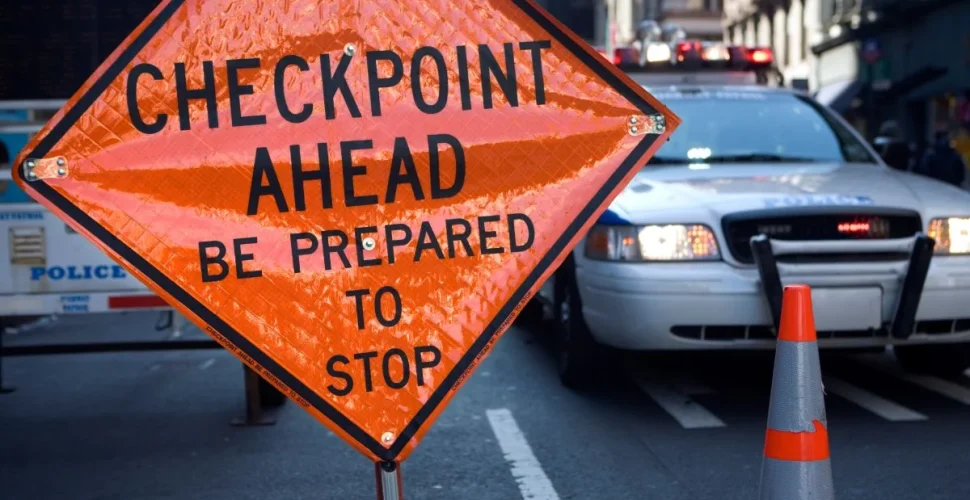|
|
Last Modified on Jul 07, 2025
Looking for info about DUI Checkpoints in Nevada County? How’d they stop you?
We at The Law Office of Jennifer Granger handle these cases all the time – the constitutional questions, the potential license issues, and those worries about what happens next. It is possible to get charges reduced or dismissed if your right were violated.
Let me ask you exactly what happened so we can talk about your specific options.
Key Takeaways
- DUI checkpoints in Nevada County are legal but must follow strict constitutional guidelines to be valid
- Law enforcement must publicly announce checkpoint locations in advance through official channels
- You have the right to remain silent beyond providing license, registration, and insurance at checkpoints
- Refusing a breathalyzer at a checkpoint may result in automatic license suspension under implied consent laws
- Understanding checkpoint procedures can help you navigate these encounters while protecting your legal rights
Introduction to DUI Checkpoints in Nevada County
Let’s talk about DUI checkpoints in Nevada County! They’re EVERYWHERE these days, especially on weekend nights and holidays. Understanding DUI checkpoints is super important if you drive in our area.
What are they exactly? DUI checkpoints are temporary roadblocks where officers stop vehicles in a predetermined pattern (like every third car) to check for signs of impairment. Nevada County uses these checkpoints as part of their overall strategy to reduce drunk driving incidents.
But here’s the thing about Nevada County specifically – with our rural roads, tight-knit communities, and limited resources, checkpoints tend to be concentrated in high-traffic areas and known trouble spots.
Look, they’re controversial. Some people view them as essential safety measures, others see them as constitutional overreach. I’m not here to debate that. Just to help you understand how they work and what your rights are.
California Office of Traffic Safety confirms these operations are specifically designed to remove impaired drivers from roadways while deterring others from driving under the influence.
DUI Checkpoint Procedures and Legal Rights
Alright, let’s walk through what actually happens at these checkpoints, because there’s a lot of misinformation out there. I’ve explained this so many times that I could probably do it in my sleep, but it’s important to understand your legal rights at checkpoints, especially since the Fourth Amendment protections against unreasonable searches and seizures still apply even though these are technically suspicion-less stops.
This is why the Supreme Court has established very specific guidelines that must be followed for a checkpoint to be considered constitutional, including requirements like having a legitimate primary purpose related to public safety, minimizing detention time for drivers, providing advance notice to the public, clearly identifying the checkpoint as an official police operation, and ensuring that field officers don’t have unlimited discretion in how they conduct the stops or which vehicles they select to pull over for additional screening beyond the initial contact.
What Happens at a Checkpoint
When you roll up to a checkpoint, you’ll see signs, cones, and uniformed officers. They’re required by law to make it obvious this is an official checkpoint. The officer will typically ask for your license, registration, and insurance. This part is mandatory.
What happens next depends on whether the officer observes any signs of impairment. If they do, you’ll be directed to a secondary screening area. If not, you’re free to go.
Your Rights During Police Stops at Checkpoints
Your rights during police stops at checkpoints include:
- The right to remain silent beyond providing basic identification documents
- The right to refuse consent to search your vehicle (though they may search anyway if they have probable cause)
- The right to decline field sobriety tests (with consequences)
- The right to request an attorney if detained
According to the U.S. Department of Justice, your Fourth Amendment protections remain in effect even at checkpoints, though courts have carved out exceptions for these specific circumstances.
How to Respond to DUI Checkpoints
People can make things worse for themselves at checkpoints. So listen up.
Before You Reach the Checkpoint
See the checkpoint ahead? Stay calm. Don’t try anything stupid. Like making illegal U-turns. Or throwing bottles out the window. Officers are watching for that.
At the Checkpoint
Have your documents ready. License. Registration. Insurance. Window down. Interior lights on at night.
Be polite. Minimal talking. Answer direct questions with direct answers. “Yes, officer.” “No, officer.” Don’t volunteer extra information.
Avoid sudden movements. Keep hands visible.
If You’re Selected for Secondary Screening
Smell like alcohol? Slurring words? Red eyes? Get ready for secondary screening.
Field sobriety tests? Your choice. But refusing has consequences. Automatic license suspension in many cases.
Phone on your lap recording? Legal. But inform the officer. Don’t be sneaky.
After the Checkpoint
Remember what time it is. Document everything afterward. Names. Badge numbers. What was said.
The National Highway Traffic Safety Administration confirms that checkpoint procedures must follow strict protocols to be legal.
Overview of Nevada County DUI Laws and Penalties
Now when we talk about driving under the influence in Nevada County, we’re really talking about the same laws that apply throughout California. The legal limit is 0.08% blood alcohol concentration for standard license holders, but it drops to 0.04% for commercial drivers and there’s essentially zero tolerance for drivers under 21.
The thing is, DUI laws at checkpoints aren’t different from regular DUI stops – it’s just the method of initial contact that changes.
First Offense Penalties
What happens if you’re arrested at a checkpoint? First offense typically means a fine between $390-$1,000 (but with penalty assessments, it can climb to nearly $4,000), potential jail time of 48 hours to 6 months, license suspension for 6 months, and mandatory DUI school.
Second and third offenses? Much worse. We’re talking longer license suspensions, more jail time, higher fines.
Field Sobriety Tests
Field sobriety tests are standardized physical tests – walking a line, standing on one leg, following an object with your eyes. They’re looking for specific clues of impairment. These aren’t particularly reliable for people with certain medical conditions or physical limitations, which is why you might consider refusing them.
California Legislative Information outlines the specific statutes related to driving under the influence in all California counties, including Nevada County.
Trends, Updates, and Future Changes in DUI Laws
Technology integration is the biggest shift we’re seeing. Expect significant changes in DUI checkpoint operations and related laws in Nevada County.
Technology Improvements
Mobile breathalyzers connected to cloud databases. Roadside oral fluid testing for marijuana and other drugs. Automated license plate readers scanning every vehicle approaching checkpoints. Enhanced video documentation of all interactions.
Legal Landscape Changes
The legal landscape is evolving too. Recent court challenges to DUI checkpoint legality have resulted in stricter guidelines for law enforcement. More transparency required. Better advance notice systems. Limits on checkpoint duration and frequency.
Marijuana DUI Enforcement
And let me be clear about something that’s changing – marijuana DUI enforcement is becoming more sophisticated as detection technology improves. Don’t think that legalization means you can drive under the influence. It doesn’t. The zero-tolerance approach for driving under the influence of drugs remains firmly in place.
(Sometimes I wonder if people realize how seriously the courts are taking this now compared to ten years ago.)
Increased Penalties
The most significant trend? Increased penalties for repeat offenders and those with extremely high BAC levels. The courts are done playing around with this issue.
What’s not changing? Your basic rights. The fundamental requirement that checkpoints be conducted according to constitutional principles.
The California DMV remains the authoritative source for upcoming changes to DUI regulations and enforcement practices.
DUI checkpoint Recap
DUI checkpoints in Nevada County are legal when properly conducted. Period.
They must follow specific protocols to be constitutional, including advance public notice and standardized stopping procedures. Your rights at these checkpoints include the ability to remain silent beyond providing basic documentation, though refusing certain tests comes with automatic penalties under implied consent laws.
Know the checkpoint locations before you head out. Many are announced on the Nevada County Sheriff’s Department social media pages and local news outlets. This isn’t so you can avoid them – it’s a legal requirement for the checkpoints to be valid.
Responding appropriately at a checkpoint means being polite but knowing your rights. Provide required documentation, answer basic questions, and if you haven’t been drinking, you’ll likely be on your way quickly.
The best strategy? Don’t drive impaired. Use rideshare services, designate a sober driver, or stay where you are. With all the transportation options available, there’s simply no excuse for risking lives – including your own.
Remember that DUI laws and enforcement strategies continue to evolve, so staying informed about current regulations is your responsibility as a driver in Nevada County.
California Office of Traffic Safety provides comprehensive information about checkpoint operations and effectiveness throughout California, including Nevada County.
Frequently Asked Questions
Q. Are there specific state DUI laws that differ in Nevada County compared to other counties?
A. Not really. Nevada County follows the same California Vehicle Code as everywhere else in the state. Same 0.08% BAC limit. Same penalties. Same implied consent laws. The only difference might be how aggressively local agencies enforce these laws compared to, say, urban counties. Nevada County tends to be pretty strict given our rural roads and higher fatality rates from DUI crashes.
Q. What should I do if I feel my rights have been violated at a checkpoint?
A. Document everything. And I mean everything. Officer names, badge numbers, patrol car numbers, time, location, what was said, what happened. Use your phone to record if possible, just make it obvious you’re recording. Don’t argue at the scene, that never ends well, trust me. Follow all lawful commands even if you believe they’re violating your rights. Later, request the checkpoint operation plan and any video footage. Then contact a qualified attorney who specializes in DUI cases. Most offer free consultations.
Q. How do DUI checkpoints impact my driving record and insurance rates?
A. Depends on what actually happens at the checkpoint. Just going through one? Zero impact. Getting arrested for DUI? That’ll wreck your finances for years. Insurance rates typically jump 80% or more after a DUI conviction. We’re talking potentially thousands more annually for at least 3-5 years. Some companies will drop you entirely. Points on your license. SR-22 requirements. Your driving record shows the DUI for 10 years in California. It’s a complete mess.
Q. Are there any apps or online tools that alert drivers about DUI checkpoints?
A. Several options. Waze. Most reliable. Community-updated in real time. Google Maps sometimes shows them too. Local police department Facebook pages and Twitter accounts. Required by law to announce them. County sheriff websites. Local news sites. Some dedicated DUI checkpoint apps exist. Quality varies wildly.
Q. How can I find current locations and schedules for DUI checkpoints?
A. Local law enforcement has to announce them publicly, it’s a legal requirement. Check the Nevada County Sheriff’s social media accounts, especially Facebook and Twitter. They’ll post a few days before. Local newspapers like The Union often publish the announcements. The CHP Northern Division page will post major holiday checkpoints. You won’t get exact locations usually, just general areas and date ranges. Don’t count on perfect accuracy, they sometimes change locations based on staffing or weather.
Final Thoughts
Here’s the bottom line: DUI checkpoints in Nevada County are legal under California’s strict requirements. Cases can be tossed when officers don’t properly announce locations beforehand (a technicality Nevada County judges actually enforce). You’ve got rights, but exercise them smartly. Time is crucial for challenging procedural… Contact us today for immediate assistance.





